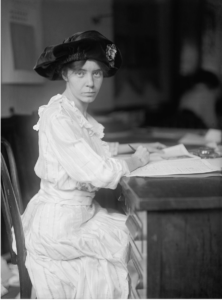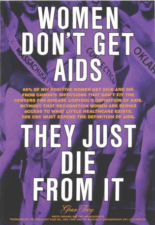For those of us who love women’s history, there is perhaps nothing more spine-tingling than to watch a piece of it come alive as a musical on a New York stage. I never imagined that, after reading books about the U.S. women’s suffrage movement and writing a biography about movement leader Jane Addams, I would watch talented actors sing and dance their way through the story — and with remarkable historical accuracy, too.
In May, I saw the new off-Broadway musical about the final years of the American women’s fight for the vote at the Public Theater in New York City. For almost three hours (excluding intermission), the show, titled Suffs, unfolded with pulsing energy and wonderful singing.
I wasn’t the only one who loved it. Word spread, tickets sold out (granted it was a small theater), and the production, which began previews March 13th, was extended three times, and finally closed on May 29th. Resale sites listed tickets for more than $3,000.[1]
The show’s creator, Shaina Taub, might have made Suffs about the battle between the suffragists (American women thought the term “suffragettes” was demeaning) and their opponents but she rejected that approach as flat and uninteresting, since she knew no one would be rooting for the losing side or have respect their laughable arguments.[2] Instead, she tells the compelling story of the struggles within the movement, while highlighting racial and generational tensions — subjects with relevance to today, or any day.
Suffs apparently begins in 1911, when Alice Paul, at 26, first emerged in the United States as a suffrage leader of the rising generation. She had just returned home from England and, bristling with optimism and determination, she brought with her the direct action, nonviolent strategies she had learned from the Pankhursts while studying in London.
Her nemesis, it soon becomes clear, is the 54-year-old president of the National American Woman’s Suffrage Association, Carrie Chapman Catt. Catt thought the best way to persuade Congress to pass the suffrage federal amendment was to continue the well-worn strategy of pressing more states to join the suffrage ranks. Paul wanted to use politics to change votes in Congress. Catt wanted to have tea with Woodrow Wilson and support his war – World War I — so that she could win him to suffrage once the war was over. Paul wanted suffragists in the streets.
Wisely, Taub brings forward the strengths and weaknesses of both leaders. She explains, “I’m not trying to glorify or vilify. I’m trying to humanize and dramatize.”[3] She wanted the musical to show that “you need a multiplicity of tactics to achieve change. .. Conflict within a movement is actually healthy and helpful.”[4]
The musical highlights two themes in the history. One is how determined and creative the younger generation was as they took up the fight. This is captured in the song, “How will we do it when it’s never been done? How will we find a way where there isn’t one?” A second theme is the younger generation’s impatience, conveyed in the songs, “How Long?” and “The young are at the gates.” In all these songs, performed with reprises, the lyrics and the actors’ passionate voices come together with powerful urgency.
Taub, at only 33, embodies both of these themes. She is a young woman of many talents who finds ways to make things happen. Famous first as a singer-song writer, she has co-starred in some off-Broadway shows, turned two of Shakespeare’s plays into musicals and played the lead in both for performances in Central Park, and collaborated with Sir Elton John by providing the lyrics for the musical, The Devil Wears Prada, which has its world premiere in Chicago this summer. For Suffs, she was the bookwriter, the lyrics, the composer of the music — and starred as Alice Paul.
If the musical centers on Paul and her tensions with Catt, the stage overflows with other historical figures. We not only meet but get to know Ida B. Wells, Inez Milholland, Doris Stevens, Lucy Burns, and Mary Church Terrell. By including Wells and Terrell, Taub ensures the show deals with the question of racism squarely.
To be sure, African American suffragists had their own disagreements over strategy. Taub evokes this brilliantly with a dueling duet between Wells, the impatient radical, and Terrell, the patient institutionalist.
And then there was the man who stood in the way. President Woodrow Wilson receives a justifiable skewering by Taub for his smarmy habit of soothing women suffragists with words unsupported by action, and for allowing — some suspect he ordered — Paul and others to be imprisoned and tortured for holding a silent demonstration for months in front of his house, the White House.
Taub picked the right story to tell since the historical record gave her all the drama she needed. But she did not just dip her toe in the story or rely on one book. She dove into the scholarship, had many conversations with suffrage historians, and even spent a month in residence at the Schlesinger Library at Harvard University, doing research in various suffragists’ papers.[5]
This effort paid off. Taub’s show draws on the latest research. Both myself and the other suffrage historians I have talked to found the show remarkably accurate, once we allowed for a certain amount of artistic license. For example, only Catt was in Tennessee when the amendment received its final state’s ratification, but the musical puts Paul there too, for good dramatic reasons.
Suffs also makes its own history. As far as I know it is the first U.S. musical to have an all-female and nonbinary cast and to use cross-gender casting for its male characters (Wilson, for example, is played by a woman).[6]
Is Suffs heading for Broadway? The idea is in the air. It is encouraging that two of Suffs’ producers helped bring the huge hit Hamilton from the Public Theater, Suffs first home, to the Great White Way. Taub will only say, “I don’t feel . . . finished with the writing. Being in the show every night, there’s so much I’ve learned, and I’m so excited to keep working on it. We have incredible producers and this incredible momentum, and I feel hopeful.”[7]
It will be interesting to see what revisions she makes. The show packs in a lot of historical detail and some paring down would strengthen its narrative arc. And a scene at the end, showing Paul, now old herself, disagreeing with the rising generation of the 1970s, makes a nice point but feels tacked on and could be cut or shortened.
Assuming Suffs makes it to Broadway, as seems likely, then it will likely make it to London too. And that would make especially good sense since Alice Paul learned her strategies from the Pankhursts. Taub could not fit that interesting fact into the dialogue of her too-long musical but perhaps she will add it, at the very least, when the show crosses the Atlantic.
Louise W. Knight is the author of two biographies, one a half-life and one a full life, of Jane Addams, and is writing a biography of the abolitionist-feminists Sarah and Angelina Grimké. She is a long-standing visiting scholar in the Gender and Sexuality Studies Program at Northwestern University, and lives in Evanston, Illinois, USA. www.louisewknight.com
Image: Alice Paul in 1915 by Harris & Ewing, from wikicommons.
Sources:
Ellen Carol DuBois, Suffrage: Women’s Long Battle for the Vote (NY: Simon and Schuster, 2020)
Amelia R. Fry and J.D. Zahniser, Alice Paul: Claiming Power (NY: Oxford University Press, 2014)
Joan Marie Johnson, The Woman Suffrage Movement in the United States (NY: Routledge, 2022)
Doris Stevens, Jailed for Freedom (NY: Pub, 1920). This memoir, the first book Shauna Taub read about the women’s suffrage movement, inspired her to create the musical Suffs.
Susan Ware, ed. American Women’s Suffrage: Voices from the Long Struggle for the Vote (NY: Library of America, 2020).
Marjorie Spruill Wheeler, ed., One Woman, One Vote: Rediscovering the Woman Suffrage Movement (Troutdale, OR: NewSage [sic] Press, 1995.
[1] “With Suffs,” Bloomberg.com, April 4, 2022.
[2] Jeryl Brunner, “Catching Up with Visionary Theater Artist Saina Taub,” May 4, 2022, Forbes.com LINK.
[3] Jennifer Schuessler, “Friendship, Betrayal and the Fight, “ March 24, 2022, New York Times.
[4] Madison Feller, “Suffs Creator Shaina Taub on Those Hamilton comparisons and Her Musical’s Broadway Future,” May 26, 2022, Elle.com
[5] “Celebrating the Schlesinger,” March 21, 2019, News and Ideas, Harvard Radcliffe Institute; conversation with historian Susan Ware, June 3, 2022.
[6] The only precedent doesn’t come close. Decades ago, the play, “The Women,” by Clare Booth Luce (later the 1939 movie), had an all-female cast but all the characters were women.
[7] Feller, “Suffs Creator Shaina Taub.”


